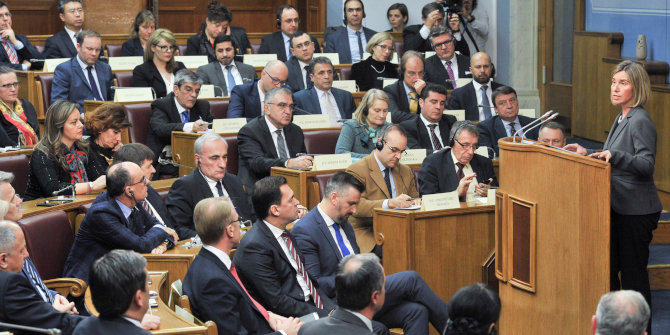 Referendums on major issues usually create a degree of uncertainty which can have a knock on effect on a country’s economy. Swati Dhingra writes that uncertainty caused by the UK’s EU referendum has already had a negative economic impact, with some British businesses putting the hiring of new staff on hold until after the vote. But if the UK votes to stay in the EU it would be far from a given that this uncertainty would disappear and a strong response from the government will be necessary to generate a quick recovery.
Referendums on major issues usually create a degree of uncertainty which can have a knock on effect on a country’s economy. Swati Dhingra writes that uncertainty caused by the UK’s EU referendum has already had a negative economic impact, with some British businesses putting the hiring of new staff on hold until after the vote. But if the UK votes to stay in the EU it would be far from a given that this uncertainty would disappear and a strong response from the government will be necessary to generate a quick recovery.
With the polls getting narrower and narrower, all economic analysis of Brexit has focused on what might happen after Britain votes to leave the EU. The general consensus is that a Brexit would have large negative effects on the British economy due to reduced trade and investment with the EU (Dhingra et al 2016). But even people who support Brexit in opinion polls expect that the verdict on June 23 will be a Remain vote. We’ve all been talking nervously over the Brexit outcome, and there hasn’t been much time to think about what happens if Britain in fact decides to remain in the EU. So what will happen if nothing happens – if Britain decides it wants to remain in the EU? Will the economy just carry on as before?
Some of the economic processes for a Remain verdict have already been set in motion. The decision to not participate in an ever closer union or the Eurozone was always a near certainty, but the renegotiation has solidified this and made them more legally binding. The biggest event however has been the rise in economic uncertainty since the referendum announcement. Britain’s uncertainty index this spring peaked to its highest level in at least 19 years. It has surpassed the peaks reached at the time of the global financial crisis, the Eurozone crisis and the Scottish independence referendum.
The uncertainty over Britain’s future relationship with its biggest trade and investment partner has manifested itself in greater volatility of the pound, which slumped when a YouGov opinion poll showed 45% support for Brexit. It has shown up in recruitment companies putting their hiring activities on hold. For example, Randstad UK found that 17% of the 340 professionals polled in May had already frozen hiring, while 25% were turning to short-term contracts to fill jobs. Investments have slowed down. Mergers and acquisitions of British companies are 70% lower this year.
The key question now is: will this uncertainty resolve itself if there is a Remain vote on 23 June? Not really, if the verdict is very tight. Then the question of a British exit will not be resolved and the uncertainty would be more protracted. A long slowdown would imply that people and businesses might be permanently affected. Recessions in the past have taught us that graduating from college in a bad economy has large, negative and persistent effects on the wages of young college graduates.
A 1% increase in unemployment in the economy translates into a 6 to 8% fall in the wages of college graduates in that year and a persistent 2.5% fall even 15 years after the downturn. Businesses born in downturns start on a smaller scale and remain smaller over their entire lifecycle. These effects are not trivial. For the US, lower growth of businesses established during the recent crisis translated into at least a 1% reduction in aggregate employment in the following ten years. So the economic woes of young millennials who’ve already suffered from the financial crisis are far from over.
A powerful verdict in favour of Remain could be the silver lining to this referendum. Historically, short sharp recessions resulting from uncertainty are often followed by quick recovery periods. Even longer periods of policy uncertainty can result in full recovery. This is what happened when Chinese exports to the US grew 33% faster after China got permanent ‘Most Favoured Nation’ (MFN) status, resolving the previous uncertainty it had faced over MFN status.
Should we expect a similar quick recovery in Britain after a clear Remain verdict? For that to happen, we need our policymakers to act like statesmen. During the 1975 referendum when a two-thirds majority voted in favour of Remain, former chancellor Roy Jenkins said “It puts the uncertainty behind us. It commits Britain to Europe; it commits us to playing an active, constructive and enthusiastic role in it.”
We need a similar vision at this historical juncture. If the verdict goes strongly in favour of Remain, it is up to our policymakers to take an active role in reforming the EU. We need them to focus on ‘competitiveness’ for the British economy – to ensure a single market for services, to make a digital single market possible, and to further the EU’s trade and competition agenda. Then Britain and the EU can hope to live happily ever after, or at least till the next referendum two generations later.
Please read our comments policy before commenting.
Note: This article gives the views of the author, and not the position of EUROPP – European Politics and Policy, nor of the London School of Economics. Featured image: St Paul’s Cathedral – London, UK. Credits: Descrier / Flickr.
Shortened URL for this post: http://bit.ly/28LQERu
_________________________________
 Swati Dhingra – LSE
Swati Dhingra – LSE
Swati Dhingra is Assistant Professor in Economics at the Department of Economics and Centre for Economic Performance, London School of Economics and Political Science.





